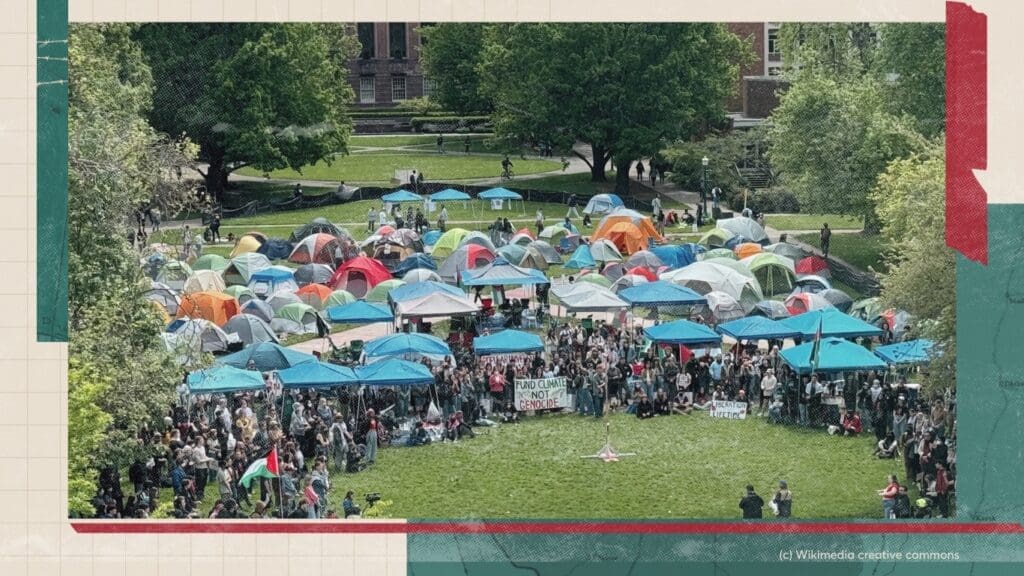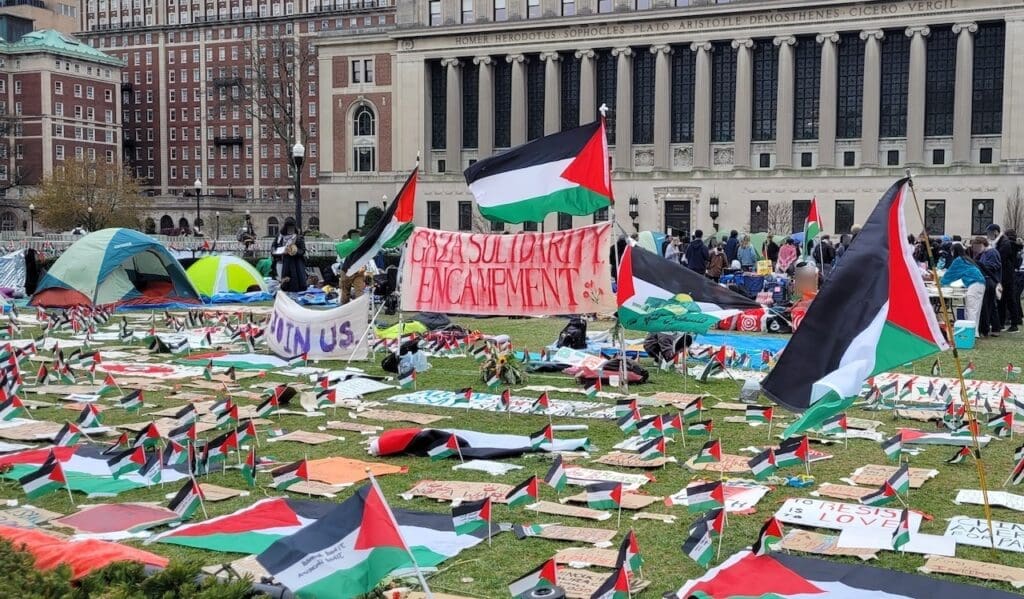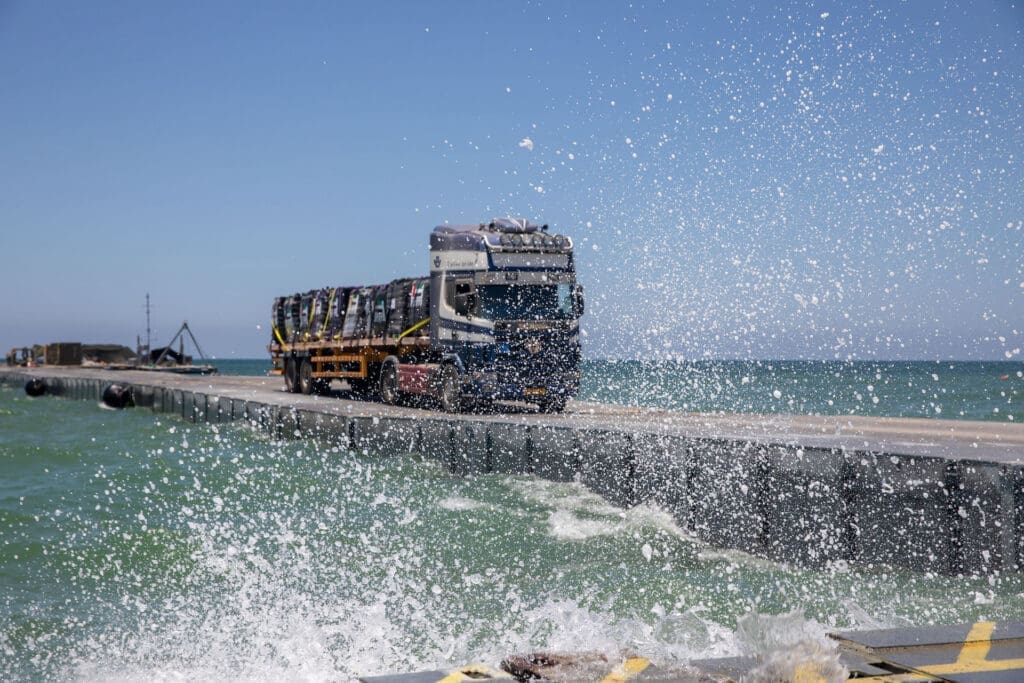- Topics
-
Topics
See our analysis on civil society and how it shapes culture, politics, and policies
Read our insights on the shifting political landscape and what it means for Palestine
Learn more about the policies and practices shaping the Palestinian economy
Strengthen your understanding of the unique conditions for Palestinian refugees across the Middle East
-
- Analysis
-
Analysis
In-depth analysis on existing or potential policies that impact possibilities for Palestinian liberation.
Insights and perspectives on social, political, and economic questions related to Palestine and Palestinians globally.
Concise analysis into a specific policy, its background and implications.
Commentary that brings together insights from multiple analysts.
Compilations of past Al-Shabaka works surrounding a specific theme.
Longer-form, ad hoc projects that seek to confront research questions outside the scope of our regular analysis.
A policy-driven research initiative by Al-Shabaka: The Palestinian Policy Network.
Our monthly webinar series that brings together Palestinian experts.
Featured
In this commentary, Samer Alatout offers key insights into this new wave of student mobilization. He details student demands and places them within the historical legacy of US student organizing. He also examines the relationship between university administrators, students, and faculty, and finds hope in the kinship emerging between the latter two groups at this critical moment. Samer Alatout· Jul 14, 2024In this policy lab, Nour Joudah and Kylie Broderick join host Tariq Kenney-Shawa to discuss some of the key lessons to be gleaned from the encampments and how we can best build on them to strengthen the Palestine solidarity movement moving forward.
Samer Alatout· Jul 14, 2024In this policy lab, Nour Joudah and Kylie Broderick join host Tariq Kenney-Shawa to discuss some of the key lessons to be gleaned from the encampments and how we can best build on them to strengthen the Palestine solidarity movement moving forward.
 On May 17, 2024, the US began operating a temporary floating pier off the coast of Gaza. Since the project’s announcement, many have expressed skepticism towards the pier’s effectiveness and deep concern regarding the US’s long-term plans and the pier’s potential role in serving Israeli objectives. This commentary examines the pier’s operations and unpacks the many incentives for its development by key geopolitical players. It positions the pier within Israel’s longer-term strategy for Palestine, using the structure as a window into understanding the regime’s broader regional aims. Temporary or not, this commentary contends that the pier must not be viewed as merely a short-term humanitarian effort, but also as a symbol of the US and Israel’s continued imperial and colonial endeavors.
On May 17, 2024, the US began operating a temporary floating pier off the coast of Gaza. Since the project’s announcement, many have expressed skepticism towards the pier’s effectiveness and deep concern regarding the US’s long-term plans and the pier’s potential role in serving Israeli objectives. This commentary examines the pier’s operations and unpacks the many incentives for its development by key geopolitical players. It positions the pier within Israel’s longer-term strategy for Palestine, using the structure as a window into understanding the regime’s broader regional aims. Temporary or not, this commentary contends that the pier must not be viewed as merely a short-term humanitarian effort, but also as a symbol of the US and Israel’s continued imperial and colonial endeavors.

-
- Resources
- Media & Outreach
- The Network




Reclaiming the Political Dimension of the Palestinian Narrative
Editor’s Note: This piece launches Al-Shabaka’s Narrative and Discourse Policy Circle, in which a team of Al-Shabaka policy analysts are working together across borders to tackle the question of whether Palestinians should have a sole, legitimate narrative and, if so, what it should be. An Al-Shabaka policy circle is a specific methodology to engage a group of analysts in longer-term study and reflection on an issue of key importance to the Palestinian people.
The Palestine Liberation Organization (PLO), once the embodiment of the Palestinian liberation movement, has effectively transformed into a non-sovereign entity – the Palestinian Authority (PA) – that presides as the warden of an archipelago of prisons in the occupied West Bank. The rupture caused by this transformation has manifested in Palestinian society across the globe as a set of acute fractures in the Palestinian historical narrative. On the 25th anniversary of the PA’s establishment, this commentary takes stock of one of the most significant frameworks for continuing the liberation struggle despite the PLO’s surrender at Oslo, namely rights-based approaches to liberation, and assesses its pros and cons.1
In the context of collectivities of people, “narrative” is the meaningful story of “us:” who we are, where we came from, where we are going, and why. Wherever foreign domination has been involved, anti-colonial nationalist currents have invariably come to the fore, often bearing a narrative that imagines an idyllic pre-colonial (and anachronistically national) past. This past, the narrative tells us, was severed by the brutality of the colonizer and can only be defeated by a heroic anti-colonial struggle that brings about liberation. Such liberation is most often imagined in the form of an independent, sovereign, and invariably national, state.
The “political” is the manifestation of power in a social body. However diffuse this power may be, it congeals around particular, interacting axes to create complex and concentrated hierarchies of privilege and marginality, thereby conditioning the extent to which groups and individuals can make their own history.2
In effect, the political is a constantly changing site of struggle. In colonial contexts, the national-racial axes of power attain such a primacy in the narratives of both colonizer and colonized that both colonist and native societies are made to appear flat: Internal structures of subordination, such as male supremacy in both societies, are ironed out of the national narrative and deferred to a utopian future date, “Independence Day,” when the “primary” (read: colonial) axis of subordination ceases to exist.
In most cases across Asia, Africa, and Latin America, the postcolonial transition involved the transformation of the liberation leadership into a new kind of despotism.3 These leaderships donned the mantle of the struggle while carrying out the corrupt business of authoritarianism as a sovereign state in a neocolonial – and since the 1980s, also neoliberal – context. For Palestinians, these new forms of structural domination and immiseration serve to compound the brutality of an ongoing settler-colonial expansion that has only intensified with the addition of PA structures as Israel’s first line of defense in accordance with the Oslo peace process.
The Rights-Based Approach: Ceding the Political to the PA
In seeking to break through the impasse created by the Oslo Accords and the sheer imbalance in military and diplomatic power that led to that historic act of submission, some Palestinians who were strategically located in the burgeoning NGO sector saw possibilities for liberation through the international legal regime. Impelled by the horrors of World War II, this regime has emphasized the rights of individuals and collectivities to be free of arbitrary cruelty and domination. The Palestinian adoption of a “rights-based” strategy to counter the Oslo impasse aimed to sidestep the PA’s international monopoly on Palestinian representation.
The Palestinian struggle, at least on an international scale, risks losing sight of its fundamentally political nature Share on XThe approach brought together groups and individuals from across the political and institutional spectrum into an amalgam that came to describe itself as Palestinian “civil society.” This current avoided the claim to political representation of Palestinians by focusing instead on their “civil,” moral-legal, representation. The PA and “civil society” thus commenced a delicate dabkeh: Rights-based advocacy would avoid stepping on political toes, leaving the PA to pick the campaigns that fit within its narrative as the caretaker of Palestinian national concerns while keeping its feet firmly planted in the pragmatic anti-principles of partition and perpetual peace process.
This rights-based civil society strategy has been highly successful, as best exemplified by the sustained momentum of Boycott, Divestment, and Sanctions (BDS) campaigns despite the leadership legitimacy crisis of both the PLO and PA that has marred recent decades of Palestinian politics. I emphasize the word “despite” because the PA leadership has regularly taken measures to undercut BDS campaign work. Rights-based successes, however, have come at a cost: By shifting the emphasis to legalist frameworks, the Palestinian struggle, at least on an international scale, risks losing sight of its fundamentally political nature.
This is exemplified in the phrase, “We demand the right of return.” This is a formulation that misses the fact that displaced Palestinians already have the right to return. The political demand is meant to be the actual return of displaced Palestinians, and with it, all the political consequences for a colonial project that denies this return for racial supremacist demographic engineering purposes. If someone abducts you, the problem is not that your right to liberty has been violated, but that you are no longer free.
The broader implications of ceding “the political” to the PA in international arenas are not limited to how we conceptualize and phrase Palestine liberation objectives such as demanding return versus demanding the right of return. Given the primacy of nationalism in the PLO-PA narrative (“We are the Palestinian nation, we are entitled to a Palestinian state”), what venues do we have to discuss class, gender, and sexual liberation within Palestinian society across the globe? How do we relate to regional and global struggles for socio-political justice, and how do we want them to relate to us – a question that takes on particular importance since most Palestinians have experienced the displacements of the ongoing Nakba and continue to wage the liberation struggle beyond the boundaries of the territory under Israeli colonial control.
On one level, the singular focus on the formalism of law deprives us of the language and space to think through such questions. On another, such legalistic frameworks have a significant determining effect on which political movements and bodies we ally with and, crucially, how and on what basis we forge such alliances and solidarities. The well-established American Civil Liberties Union (ACLU) can be a powerful and most welcome ally in stemming the tide of constitutional rights violations that, say, BDS organizers face in the United States. However, there is a clear line beyond which a professionalized institution with a legalist mandate such as the ACLU cannot go – a line that stops far short of publicly throwing its weight behind such a “controversial cause” as Palestinian liberation.
An organized popular movement such as the Dream Defenders, on the other hand, faces no such constraints. It does not engage with Palestinian liberation as a result of being galvanized by the nuances of international legal exegesis churned out by Palestinian civil society. In the Dream Defenders’ analysis, the Palestinian struggle is a political struggle against racist settler-colonial injustice that both resembles and enjoys a “special relationship” with the racist settler-colonial state that the Dream Defenders confront in their own struggles. The line between institutional endorsement and solidarity in struggle is rarely a fine one: It is the difference between the carefully calculated contributions of the well-established and the body-on-the-line solidarity of those with nothing to lose but their chains.
The rights-based, gentlemanly politics of law and legal institutions has offered Palestinian “civil society” a way around the Oslo impasse that allows its leaders – and those of our sole legitimate representative – access to polite society.4 This has come at the cost of setting the bar low, that is, a situation in which the international legal regime not only determines the ceiling of our political demands, but the language we use in thinking about and imagining what liberation means to us. This low bar, or the legalese-ation and depoliticization of Palestinian politics, has meant that well-funded, highly professionalized institutions – the ones, like the ACLU, with the most to lose in terms of access, funding, and public relations headaches – become both the partners of choice and the models for our own political organizing when we engage in rights-based “advocacy.”
It is a further reason why the PA perceives no threat from rights-based campaigns to its role as the first line of defense in regard to Israeli settler-colonialism: Such campaigns operate with the same logic, language, and limitations of gentlemanly compromise that the PLO adopted as it metamorphosed into the PA. We would do well to remember that every major Palestinian victory could not have been attained without the sacrifices of the threadbare Hanthalas in Palestinian society within and beyond the Mandate territory of Palestine. Though some wear Hanthala necklaces that are worth more than what that child refugee’s family subsisted on for several months, this should not allow us to forget that every major Palestinian surrender was the product of the gentlemanly compromises of polite society.
Consider, for example, the centrality of workers and peasants in the 1936 General Strike and the armed uprising that lasted until 1939, and the role of the large Palestinian landowning families in ending both mass movements. One might also compare the Lebanese intelligence service (the dreaded deuxième bureau) that the Palestinian refugee movement rose up to remove from the camps in late 1960s Lebanon to the current role of the PLO “embassy” in Lebanon, which facilitates intelligence gathering and the monitoring of Palestinians in that country. It is most relevant to this article to contrast the mass movement of Palestinians on all sides of the “Green Line” that began in the 1970s and culminated in the 1987 Intifada with the role of the moneyed Palestinian elite in pushing for “the peace of the brave.”
Every major Palestinian surrender was the product of the gentlemanly compromises of polite society Share on XWhere does this leave BDS campaigns? If anything, there needs to be more participation in and support for BDS, especially by those who recognize its political possibilities and the limitations of its legal frameworks. It is well beyond the mandate of BDS campaigns to address the socio-politics of Palestinian communities, let alone decide on the politics of liberation strategies and “solutions.” BDS organizations do not, and indeed cannot, claim to be representative organizations or parliaments, and since they overwhelmingly take aim at third parties – corporations, investment funds, cultural institutions, inter-state arrangements – that are neither the Israeli state nor its Palestinian quisling regime, they cannot be held responsible for the failures of the liberation movement at large.
It is just as important to realize that the attempt to hold Israel morally and legally accountable on an international level is not a politics in and of itself, let alone a liberation strategy. It is an auxiliary tactic that, at the very most, helps even the playing field for the political struggle of ending the Zionist settler-colonial project that has established an exclusivist and patriarchal ethno-state on Palestine. What I have aimed to highlight here are the pitfalls of elevating a tactic – the use of international legal forums and institutions in support of liberation objectives – to the status of liberation strategy. It is worth noting here that the tactic of “armed struggle” enjoyed a similarly exalted status as the silver-bullet strategy that would liberate Palestine.
Seeking the Narrative of Political Mobilization to Achieve Liberation
As mentioned, when liberation movements base their liberation strategies and narratives on institutionalized international solidarities, they are compelled to comply with the language and logic of those institutions. One of the best historical illustrations of this comes from the PLO experience itself. After the 1967 war, the principle of partitioning Palestine achieved the status of “international consensus” through the interpretations of UN Security Council Resolution 242. Several Arab states were all too eager to step in to circumvent the PLO and speak for Palestinians by accepting this consensus on Palestinians’ behalf. Partition was effectively set as the precondition for the international recognition of the PLO as the sole legitimate representative of the Palestinian people, and the PLO leadership saw this legitimacy as the precondition for liberation. In other words, there would have been no “gun and olive branch” speech by Yasser Arafat at the UN General Assembly in November 1974 if the Arab League had not endorsed the PLO as the bearer of the Palestinian political monopoly at the Rabat summit a month before. That recognition, in turn, would not have occurred had the PLO not officially endorsed the partition of Palestine in its June 1974 ten-point-program.
Even with the benefit of hindsight, we cannot completely fault Arafat for recognizing the PLO’s weakness in the international imbalance of power, and the dangers of having other, more powerful bodies usurp the self-representation that Palestinians had sacrificed so much to attain. Similarly, Palestinian political organizers in the 2000s had to find a way to circumvent the hard reality that the 1974 program had set in motion the transformation of the Palestinian political leadership into an appendage of settler-colonial power while maintaining its monopoly on Palestinian political representation. Likewise, given that operating in global civil society milieus requires the language of international law and international consensus as a common basis for communication and decision-making, we cannot fault the standard-bearers of rights-based campaigns for doing all they could to use the international consensus on human rights to hold Israel to account for its violations.
The attempt to hold Israel accountable on an international level is not a politics in and of itself, let alone a liberation strategy Share on XRather than seeking a target to blame, I hope instead to convey the urgency of advancing forums and actions in which political questions take center stage above and beyond the fetters of state-level or international consensus. This is not a call to completely dismiss international law. Rather, it advocates returning to the original spirit of the 2000 Intifada, when the leaders who would become “Palestinian civil society” were simultaneously formulating both the beginnings of BDS and ways to use the international legal regime to sidestep the Oslo political impasse. In 2004, as the International Court of Justice issued its ruling on the consequences of Israel’s separation wall, the now-famous novelist China Miéville was finalizing his book Between Equal Rights. After familiarizing himself with how Palestinian political organizers sought to respond to the historic ruling, Miéville added this to his manuscript before it went to press:
…precisely mindful of the political reality that underpins the forging and exposition of international law, the Palestinians are prepared to self-stall the “international-law-ness” of their very international legal victory and will attempt instead to use it to mobilize extra-legal public opinion. This is an understanding that it is popular pressure from below rather than international law that represents the best hope for the Palestinian cause, and that the most “progressive” international legal decision is best deployed insofar as it leaves the realm of international law.
Miéville’s choice of the phrase “public opinion” stands in for the kinds of political mass mobilization that were internationally referred to in those years as “globalizing the intifada” – mobilization that went far beyond the struggle to attain a state in which Palestinian VIPs could exploit very unimportant persons without settler-colonial interference. Globalizing the intifada was the politics of the 2011 refugee return demonstrations, and has been the politics of the similar but far more sustained Return Marches in the Gaza Strip over the past months. Such mobilization has incinerated the fantasy narrative of attaining statehood through the niceties of an international order that has never shown any inclination toward enforcing its own moral-legal standards with regard to Israel. Again, it was the threadbare Hanthalas who put their bodies on the line while gentlemen invested what remained of their tattered corpses for better service in VIP lounges.
It is time that the politics underlying the global intifada be treated as paramount in shaping how we use international law as one of many tools of struggle, not the other way around. The narrative that helps us see and act clearly for the purpose of political mobilization toward human liberation must take center stage – not the narrative that parades our national “rights-based” victimhood before the gentry of polite society in the hope that the Palestinian elite can secure a good seat from which to delight in the grotesque orgy of exploitation consuming our world.
Hazem Jamjoum
Latest Analysis
Student Organizing & Change-Making on University Campuses
Student Uprising: From US Campuses to a Global Movement
The Floating Gaza Pier: A Symbol of Future Colonial Plans
We’re building a network for liberation.
As the only global Palestinian think tank, we’re working hard to respond to rapid developments affecting Palestinians, while remaining committed to shedding light on issues that may otherwise be overlooked.